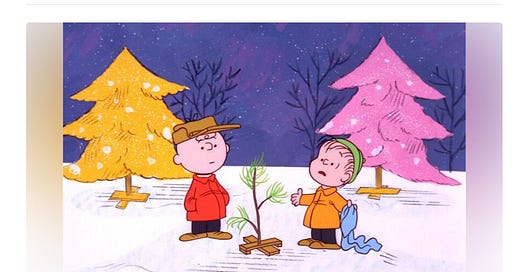Meaning of Christmas
Authenticity is attractive, "not because it was flashy or followed the rules, but because it was sincere."
Well, if Apple needed an Android user to pony up some cash, leave it to Lucy and crew to pop open the piggy bank. No time to act like Scrooge, right? My sacrifice to you, my faithful readers, is to free-trial all these sources during research. Like a Robin Hood of Substack, I fall down the fabbit-hole, gathering analog knowledge once free, from the digital empire overlords, and give it to the unwashed masses. I then forget about the free part and only notice it when the credit card get clicked.
It’s all worth it. Watching A Charlie Brown Christmas this morning was delightful. The magic holds. Honest humor is timeless. Sincerity still satisfies.
It’s hard to imagine the holidays without “A Charlie Brown Christmas.” The 1965 broadcast has become a staple of the season for many generations.
But this beloved TV special almost didn’t make it to air. CBS executives thought the 25-minute program was too slow, too serious and too different from the upbeat spectacles they imagined audiences wanted. A cartoon about a depressed kid seeking psychiatric advice with no laugh track, lo-fi animation and a Bible passage seemed destined to fail.
Yet against all the odds, it became a classic. The program turned “Peanuts” from a popular comic strip into a multimedia empire — not because it was flashy or followed the rules, but because it was sincere.
Born of the corporate union between Coca-Cola and CBS, the Christmas classic criticizing commercialization and secularization of the holiday is now available only if your paying for it though. From AppleTV+. Apropos.
But like most everything today, the backstory tells the real story. It’s success over the years and the place it occupies in our collective heart might be a canary in the coal mine. Corporate shilling on camera during popular programming basically built the TV industry and realigned marketing departments nationwide.
It attempted to incorporate authenticity into product-pitching, but watching cavemen hotbox a Winston jumped the shark waaaay before the Fonz. I can’t help but think about the parallels between that search for authenticity then and our extrospective exploration for electoral explanation now. It’s not hard. Be real.
The show would use real children’s voices instead of adult actors’, giving the characters an authentic, simple charm. And Schulz refused to add a laugh track, a standard in animated TV at the time. He wanted the sincerity of the story to stand on its own, without artificial prompts for laughter.
Meanwhile, Mendelson brought in jazz musician Vince Guaraldi to compose a soundtrack. The music was unlike anything typically heard in animated programming, blending provocative depth with the innocence of childhood.
Most alarming to the executives was Schulz’s insistence on including the heart of the Nativity story in arguably the special’s most pivotal scene.
When Charlie Brown joyfully returns to his friends with the spindly little tree, the gang ridicules his choice. “I guess I really don’t know what Christmas is all about,” he sighs.
Gently but confidently, Linus assures him, “I can tell you what Christmas is all about.” Calling for “Lights, please,” he quietly walks to the center of the stage.
And what was the secret sauce for this quirky program? Real voices, instead of actors. No fake laughter, just sincerity. An original soundtrack weaving together tradition and nuance. And God. Have we seen this show before? Or is it just a case of real-life imitating art?
Here is a long-hidden clip that has been edited out of history. Bottling plants were so ubiquitous, literally “in your town”, alluding to major economic shifts between 1965 and 2024. How many “your towns” have a Coca-Cola plant today?
I wrote a post a few months ago, and it seems timely. Trump has been Trump since the 1980s. His arc has risen and fallen, risen and fallen. And now, risen yet again. Is he destined for yet another crash and burn? Time will tell. But Gen-X is a societal force that has just awakened. The overarching narrative missed by many (not ironically, many of those missing this narrative are not of this cohort) is the facet of “realness”.
The trait of sincerity and authenticity is palpable. People feel it and know it intuitively. It’s an attractive quality in a person’s character. A TV show’s, or a candidate's, sincerity and authenticity are crucial for attracting Gen-X, as this generation is highly skeptical of traditional authority and deeply attuned to inauthenticity. Their unique upbringing and cultural experiences—shaped by latchkey independence, exposure to institutional failures, and an "Age of Irony" ethos—make them demand a grounded, no-nonsense approach from leaders.
Gen-X voters are drawn to sincerity and authenticity because they’ve been conditioned to distrust superficiality and empty promises. A candidate who speaks candidly, owns their imperfections, and connects through shared values—while avoiding pandering—can cut through their skepticism. For Gen-X, actions and integrity matter far more than image, making authenticity the ultimate litmus test for leadership.
Be well friends, and enjoy the actual meaning of this Christmas season.
Ric
https://faroutmagazine.co.uk/how-coca-cola-was-integral-to-making-charlie-brown-christmas/
https://www.huffpost.com/entry/was-there-originally-a-co_b_8680684







